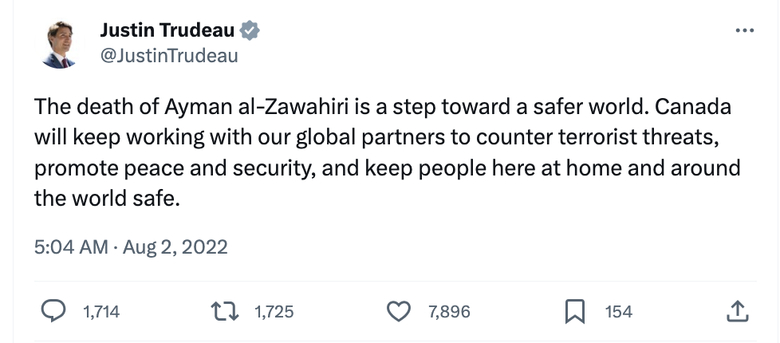Canadian Prime Minister Justin Trudeau has ignited a diplomatic firestorm by accusing India’s Modi government of murdering a Sikh activist in Canada. Despite its decision to go public with the accusation, Trudeau’s government has refused thus far to disclose any of the evidence on which the accusation is based. Nonetheless, and predictably, Canada’s punditry has reacted with righteous indignation while ignoring the full geopolitical context in which this controversy has erupted.
Who is Hardeep Singh Nijjar?
The murder victim, Hardeep Singh Nijjar, was the 45-year-old president of the Guru Nanak Gurdwara in Surrey, B.C. On June 18, 2023, he was fatally shot in the parking lot of a Sikh temple by unidentified assailants.
According to The Globe and Mail, Mr. Nijjar arrived in Canada from India in the 1990s and later became a Canadian citizen. In British Columbia, he was known as a prayer leader and an outspoken advocate of Sikh separatism. He pushed an unofficial referendum among Sikh diaspora in Canada, Europe and Australia to press for an independent Khalistan.
In 2020, India’s government declared Mr. Nijjar a terrorist. Indian journalist Barkha Dutt, who is based in New Delhi, says that Mr. Nijjar was wanted for multiple crimes in India. In 2016, Indian authorities filed a red notice with Interpol for his arrest.
Veteran CBC journalist Terry Milewski, who has covered Sikh separatism in Canada for many years, recently told Ms. Dutt that there is “accumulating evidence” that Mr. Nijjar’s murder “was not some sort of geopolitical hit launched by the Modi government to eliminate Khalistanis overseas, rather it sounds like it could have been a squalid, sordid little local gangland, tit-for-tat settling of accounts, a revenge killing.”
What, exactly, has Trudeau alleged?
On September 19, 2023, Justin Trudeau rose in Parliament to inform Canadians that, over the past several weeks, “Canadian security agencies have been actively pursuing credible allegations of a potential link between agents of the government of India and the killing of a Canadian citizen, Hardeep Singh Nijjar.”
In making this explosive allegation, Trudeau offered no evidence to support his allegation.
Moreover, the words Trudeau employed, which he presumably chose carefully, were so ambiguous as to be almost meaningless.
Who made these allegations, and how credible are they? A “credible” allegation is not necessarily a true (or even a compelling) allegation. An accusation can be false and credible at the same time.
Moreover, what did Trudeau mean by “link”, and why did he qualify the term “link” with “potential”?
What, in Trudeau-speak, is an “agent of the government of India”? Would an assassin who killed Nijjar because he was influenced by the Modi government’s assessment that Nijjar is a “terrorist” be considered an “agent” of the Modi government, or would the assassin have to be on the Indian government’s payroll to be considered an “agent” of that government?
Soon after Trudeau made his statement in Parliament, the CBC’s Evan Dyer breathlessly reported that the Canadian government had “bombshell” evidence of India’s crime, in the form of intercepted conversations among Indian diplomats. According to Dyer:
Canadian sources say that, when pressed behind closed doors, no Indian official has denied the bombshell allegation at the core of this case — that there is evidence to suggest Indian government involvement in the assassination of a Canadian citizen on Canadian soil.
Other than disclosing that his sources are Canadian (which tells us nothing about their credibility), Dyer fails to provide any meaningful information about his sources. Presumably, they come from the Canadian intelligence community, but why would anyone trust sources from the Canadian intelligence community – especially when those sources refuse to identify themselves? The Canadian Security Intelligence Service is a pathological liar. It destroyed its credibility long ago.
Besides, if Canada had a recording of an Indian diplomat acknowledging that the Modi government was behind the killing of Nijjar (something which Evan Dyer does not assert), it strains credulity that the Canadian government would refrain from telling the world that it has such evidence.
Trudeau undoubtedly understood that going public with this accusation would poison relations between Modi’s government and his own. So why did Trudeau go public when he was unwilling to disclose any evidence to support the accusation, and when the most that he was prepared to say was that there were “credible allegations of a potential link”?
According to Canadian media reports, Robert Fife, the Ottawa Bureau Chief of The Globe and Mail, had learned of Canadian security agencies’ “credible allegations”, and was on the verge of disclosing them, when Trudeau decided to go public with the allegations. Pundits like Andrew Coyne insist that, at that stage, Trudeau had no alternative but to disclose the allegations to the whole world.
Coyne’s reasoning is dubious.
Reporters often learn from anonymous sources that police are investigating some individual in connection with a crime. When that happens, government officials frequently decline to comment on the basis that the investigation is ongoing and that any comment on the claims of the anonymous sources could prejudice the investigation. Also, someone who is identified by government officials as a suspect in a serious crime could be stigmatized and suffer permanent reputational damage, even if the authorities ultimately decide that there is insufficient evidence to support a conviction or even to justify a prosecution.
In a society which purports to value the presumption of innocence, government officials should be loathe to comment on allegations of criminality before the investigation is complete.
Extrajudicial assassinations are a specialty of the U.S. government
When Trudeau delivered his stunning accusation to the world, he understandably condemned the killing of a Canadian on Canadian soil. Trudeau went further than that, however, and piously invoked international law, stating:
Any involvement of a foreign government in the killing of a Canadian citizen on Canadian soil is an unacceptable violation of our sovereignty. It is contrary to the fundamental rules by which free, open and Democratic societies conduct themselves… I also expect [India] to reiterate that its position on extrajudicial operations in another country is clearly and unequivocally in line with international law.
Although the United States has assassinated countless alleged terrorists on the soil of sovereign nations, no Canadian leader, including Justin Trudeau, has ever demanded U.S. compliance with international law.
Just last year, the Biden administration announced that it had assassinated Ayman al-Zawahiri in Afghanistan. Al-Zawahiri was an Egyptian-born physician who was reputed to be the second-in-command of Al Qaeda at the time of the 9/11 attacks. Although there are compelling grounds to challenge the legality of al-Zawahiri’s killing, no Western government questioned whether the killing complied with international law. On the contrary, Justin Trudeau went so far as to praise the Biden administration for assassinating al-Zawahiri:

In 2018, the Trump administration nearly ignited a devastating war with Iran when it assassinated Iran’s top General, Qasem Soleimani, in Iraq. Five Iraqi nationals and four other Iranian nationals were killed alongside Soleimani, including the deputy chairman of Iraq’s Popular Mobilization Forces.
A report by the UN’s special rapporteur on extrajudicial killings, Agnes Callamard, declared the killing unlawful, stating that the U.S. government had failed to provide sufficient evidence of an imminent threat to life, and that “absent an actual imminent threat to life, the course of action taken by the US was unlawful.”
At the time of Soleimani’s killing, Canada had about 500 troops in Iraq. Although a large-scale response from Iran might have put those troops at risk, the Trump administration did not warn the Trudeau government in advance that it planned to assassinate Iran’s top general. Even this was not enough to elicit public criticism of Trump’s illegal killing from Trudeau. Instead, anonymous officials from the Trudeau government meekly complained to the CBC that “Canada should have been warned in advance by the Americans…”
Invariably, Western supremacists will argue that the there’s a difference between these killings and the killing in which India is alleged to have been complicit, because al-Zawahiri and Soleimani were in fact terrorists. Even if that is true, however, it does not render their killings lawful – especially when those killings occur on the soil of a sovereign state and without the consent of that state’s government.
Moreover, it is now indisputable that American drone strikes in foreign countries have killed not only persons who were credibly accused of terrorism, but also civilians. Many of them, in fact.
In 2015, American Daniel Hale, whose job involved identifying targets for U.S. drone strikes, provided journalist Jeremy Scahill with secret military documents and slides that exposed shocking details about the U.S. drone program. The documents revealed that the Obama administration had killed countless civilians in undeclared war zones by targeting cell phones that might not be carried by suspected terrorists. Rather than hold the culpable U.S. officials accountable, the Trump administration prosecuted Daniel Hale and secured a prison sentence of forty-five months.
Predictably, the Trudeau government said nothing.
Lest there by any doubt as to where I stand on unlawful extrajudicial killings, I condemn them all, regardless of the identities of the perpetrators or the victims. If India’s government is complicit in the killing of Nijjar, then it should be condemned and held accountable, in accordance with international law.
Nonetheless, the selective indignation of Canada’s government is an embarrassment to our country. It has been widely reported that many in India are angry with Trudeau for publicly accusing their government of being behind the murder of a Canadian citizen whom their government deems to be a ‘terrorist’. It might just be that their indignation has something to do with the Canadian government’s outrageous double standards.
The geopolitical context: Is Biden using Trudeau to make India look bad?
Western mainstream media have responded to Trudeau’s allegation by claiming that Canada has put the Biden administration in an uncomfortable position. India, we are told, is a key part of Biden’s Indo-Pacific strategy to ‘contain’ China and Russia. By supporting Canada in its dispute with India, they argue, Biden might well alienate the Modi government and imperil his administration’s efforts to enlist Modi as an ally against the U.S. government’s geopolitical rivals.
This narrative ignores the reality that, when it comes to India, Biden’s Indo-Pacific strategy has failed. Spectacularly.
As was widely reported at the conclusion of the G20 summit in India on September 9-10, Biden and his Western partners in the G20 had urged the participants to issue a collective condemnation of Russia’s invasion of Ukraine. The G20 summit in 2022, held in Indonesia, issued such a condemnation. As reported by The Independent, however, the 79-paragraph G20 declaration that emerged from India was a “big win” for Russia because it “avoided any direct criticism of Russia for its war against Ukraine”.
From the Biden administration’s perspective, the G20 declaration is likely to be the least of India’s ‘sins’.
Far more consequential is the Modi government’s refusal to sanction Russia. Russia has effectively nullified the West’s price cap on Russian oil, in part by using a “dark fleet” of oil tankers that do not employ Western insurance or other services. Many of those tankers are owned by companies in India. In addition, India has been purchasing large quantities of Russian oil and reselling it to European customers. As reported recently by the Financial Times, European countries like Germany have increased their imports of oil products from India, indirectly buying Russia’s produce.
Moreover, India remains firmly committed to the BRICS, which includes China and Russia. With the BRICS’ recent expansion – which India ‘fully supported’ – the BRICS threatens to displace the G7 as the most influential and powerful economic bloc in the world. Ominously for the United States, BRICS’ leaders openly aspire to end the era of U.S. dollar hegemony, which would diminish the U.S. government’s borrowing capacity and its ability to impose its will on disobedient states.
These factors suggest that the Biden administration has a strong motivation to apply pressure on India. That being said, the mere fact that it has such a motivation does not mean that it is, in fact, the driving force behind the Trudeau government’s accusation against the Modi government.
Still, there are other indications that the U.S. could be pushing Trudeau to accuse India of the crime.
According to the CBC, the “signals intelligence” upon which Trudeau based his accusation did not come solely from Canadian security services. Part of that “intelligence” came from another member of the “Five Eyes” intelligence network, which consists of the the United States, Canada, the United Kingdom, New Zealand and Australia. The CBC has not disclosed which member of the Five Eyes provided that “intelligence” to Canada. Meanwhile, the U.S. Government has neither confirmed nor denied that it is the source of the “signals intelligence” Canada received.
Nonetheless, given the sophistication of U.S. intelligence-gathering capabilities and its record of intercepting confidential communication among officials of allied governments, it is entirely possible that U.S. intelligence services are Canada’s source.
Other indications of U.S. involvement include recent statements by U.S. Secretary of State, Antony Blinken. When asked to respond to reports that the U.S. government was reluctant to take a side in this dispute, Blinken said that the Biden administration was “deeply concerned” about the allegations and that it wanted to see “accountability”. He added that “we have been consulting throughout very closely with our Canadian colleagues, and not just consulting, coordinating with them on this issue.”
Ultimately, I do not purport to know whether the Modi government is behind the killing of Nijjar. Given Modi’s disturbing human rights record – and particularly his government’s appalling treatment of Muslims – it is at least plausible that the Modi government is behind the murder of a Canadian whom it deemed to be a ‘terrorist’.
It is also plausible, however, that the Biden administration has cooked this whole mess up based upon nothing but innuendo and suspicion, and that it has done so in order to send a shot across Modi’s bow.
In the circumstances, the sensible thing for Canadians to do is to withhold their judgment, and to wait for more evidence to emerge (assuming more evidence exists).
After all, if the sordid Meng affair taught us anything, it’s that the U.S. government will not hesitate to use Canada as a proxy to irritate its rivals – even when doing so causes severe damage to Canada’s relations with powerful states.




